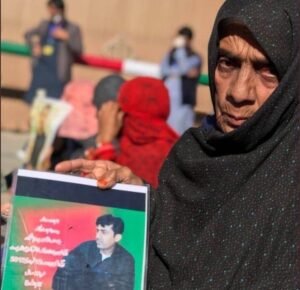Pakistan’s Internal Crises Complicate Diplomatic Relations with Afghanistan

Pakistan's capital, Islamabad Photo: @Ali Ahmad
By Shinwari
Pakistan’s recent diplomatic efforts to improve relations with Afghanistan have been unsuccessful. On February 22, a senior Pakistani delegation, including Defence Minister Khwaja Asif and Lieutenant General Nadeem Anjum, Director General of Pakistan’s Inter-Services Intelligence (ISI) agency, visited Kabul to hold talks with the Taliban leadership.
This visit occurred shortly after the Torkham border crossing was closed, raising tensions between the two countries. The delegation’s purpose was to meet with Mullah Abdul Ghani Baradar, Afghanistan’s acting deputy prime minister for economic affairs. The high-level meeting occurred against the backdrop of increasing violence by the Tehrik-i-Taliban Pakistan (TTP) in various parts of Pakistan. The meeting reportedly ended in a stalemate, as the Taliban refused to address the TTP issue but agreed to improve bilateral economic and trade relations.
The delegation from Pakistan was left embarrassed as the Taliban government did not even officially acknowledge that the TTP issue was part of the meeting and simply emphasized the importance of trade and commerce relations between the two countries.
The Taliban’s official handle tweeted important remarks of Mullah Abdul Ghani Baradar Akhund, the Deputy Prime Minister for Economic Affairs, after the meeting: “Deputy Prime Minister for Economic Affairs added, “Pakistan and Afghanistan are neighbours and should get along well. The Islamic Emirate of Afghanistan emphasizes the development of commercial and economic ties with Pakistan as they are in the interest of both countries.”
Furthermore, the Taliban side urged Khawaja Asif and other officials to “release Afghans being detained in detention facilities in Pakistan.” The official statements released by both sides indicate that there were significant differences regarding the issue of terrorism allegedly originating from Afghanistan.
Pakistan’s foreign office released a statement detailing the bilateral meeting, which included discussions on “security-related matters, including counter-terrorism measures.” The meeting represented Islamabad’s urgent effort to persuade the Taliban to rein in the TTP members operating from Afghanistan. Additionally, it is apparent that the delegation talks included the cross-border implications of trade, particularly the border skirmishes at Torkham and Chaman-Spin Boldak, as well as the alleged cross-border movements of the TTP and Islamic State Khorasan Province (ISKP) militants.
With the growing mistrust against Islamabad’s border control efforts and allegations of ISI’s involvement in providing material and infrastructure support to the ISKP, the presence of DG ISI at the delegation meeting suggests that the discussions could have also focused on the last few months of the TTP attacks, within the “framework of securing Pakistan’s national security and interests.” If these assumptions hold true, it is possible that the Taliban could impose policy options on Islamabad, forcing them to make concessions on cross-border trade and possibly granting a second opportunity for peaceful negotiations with the TTP.
Despite recent diplomatic efforts, the relationship between Pakistan and the Taliban is expected to face more challenges. Pakistan is currently grappling with unprecedented internal political and economic crises, and the Taliban leadership is closely monitoring these developments, making them cautious about making any hasty decisions in favor of Pakistan.
Furthermore, Islamabad has been unsuccessful in persuading other countries to formally recognize the Taliban government in Afghanistan, adding to the strain on their relationship. Ongoing tensions over the TTP issue, regular cross-border skirmishes, and frequent border closures have only worsened ties between the two countries. Given the circumstances, the Taliban are unlikely to feel obligated to serve Pakistan’s strategic interests in the region.
The ‘Hafiz Gul Bahadur’ group, a faction of TTP in North Waziristan tribal district, has announced the launch of the “Tariq ibn Ziyad” annual ‘Spring Offensive’ against Pakistan’s security forces on March 12, further straining the already troubled relationship between Pakistan and the Taliban. This offensive is expected to escalate violence in Khyber Pakhtunkhwa and give Pakistan an opportunity to portray itself as a “victim” and make a case against the Taliban government regarding the TTP issue.
During the Munich Security Conference in February, Pakistan’s foreign minister, Bilawal Bhutto-Zardari, emphasized that the “security and terrorist threat emanating” from Afghanistan was the most significant issue in the region. Bhutto-Zardari openly accused the Taliban’s interim government for not taking actions against the TTP in Afghanistan. He said, “The concern is that if we and the interim government don’t take these groups seriously and they don’t demonstrate the will and the capacity to take on terrorist groups, then they will conduct terrorist activities in the region first – we are already witnessing an uptick in terrorist activity in Pakistan since the fall of Kabul – but it won’t be long before it reaches somewhere else.”
In a stern response to Bhutto-Zardari’s allegations, the Taliban said Pakistan should discuss bilateral issues face-to-face instead of “complaining at international conferences”. These statements have openly highlighted the current state of relations between Afghanistan and Pakistan.
It is noteworthy that as a reciprocal visit to the February 22 delegation meeting between Afghanistan and Pakistan, representatives from the Taliban government were due in Islamabad for continuation of talks related to various issues “including regional security and counter-terrorism measures.” However, the delay suggests inherent mistrust between Pakistan and the Taliban, which will persist in the coming months.
* Author chooses a single pseudonym. Shinwari is a freelance journalist based in Peshawar, Pakistan.
Note: The contents of the article are of sole responsibility of the author. Afghan Diaspora Network will not be responsible for any inaccurate or incorrect statement in the articles.











